Reflective Essay on Leadership Philosophy and Organizational Behavior
VerifiedAdded on 2023/02/01
|9
|2713
|72
Essay
AI Summary
This essay is a reflective analysis of leadership philosophy within the context of organizational behavior. The student explores their personal leadership style, identifying servant leadership as a core approach, emphasizing characteristics like empathy, active listening, and commitment to people. The essay delves into leadership principles, such as prioritizing people over position, valuing communication and wisdom, and the importance of creating stability while driving change. It examines the impact of personal beliefs on leadership, advocating for inclusivity and trust. Furthermore, the essay addresses a key leadership challenge – lack of alignment – and demonstrates how servant leadership can be applied to resolve conflict and foster a cohesive team environment. The student emphasizes the importance of transparency, effective communication, and conflict management in achieving organizational goals, concluding with a reflection on the value of reflective writing for professional development.
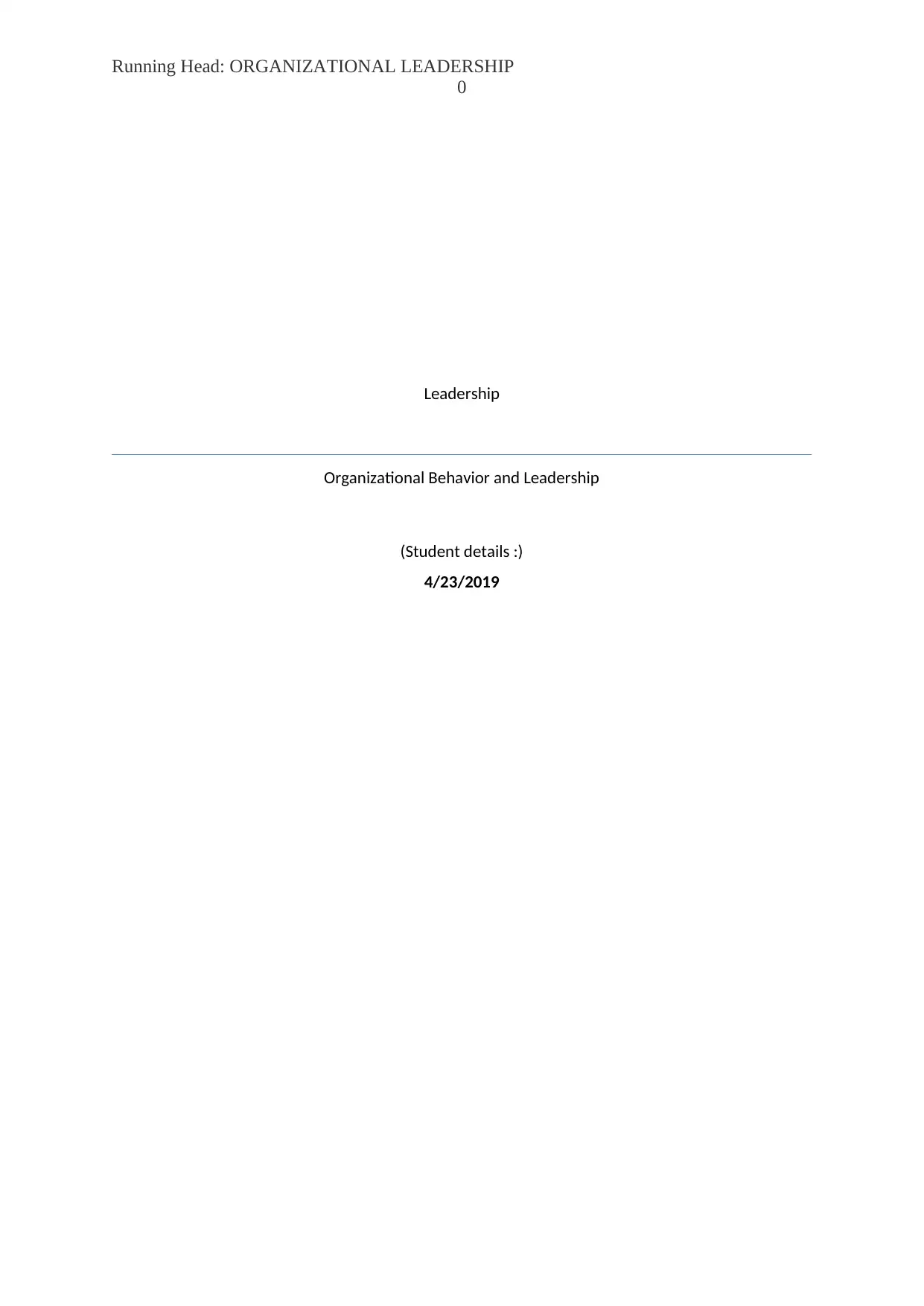
Running Head: ORGANIZATIONAL LEADERSHIP
0
Leadership
Organizational Behavior and Leadership
(Student details :)
4/23/2019
0
Leadership
Organizational Behavior and Leadership
(Student details :)
4/23/2019
Paraphrase This Document
Need a fresh take? Get an instant paraphrase of this document with our AI Paraphraser
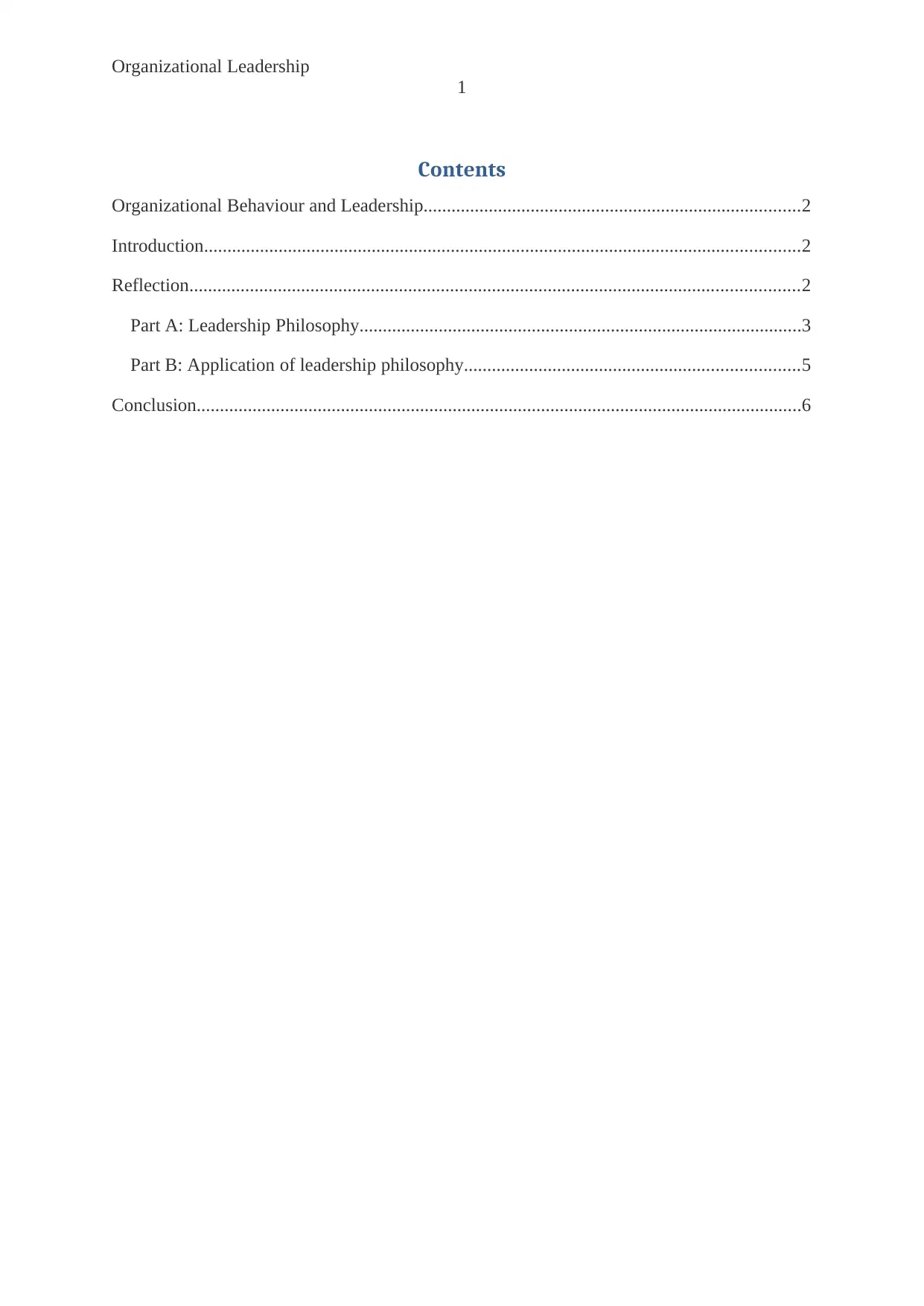
Organizational Leadership
1
Contents
Organizational Behaviour and Leadership.................................................................................2
Introduction................................................................................................................................2
Reflection...................................................................................................................................2
Part A: Leadership Philosophy...............................................................................................3
Part B: Application of leadership philosophy........................................................................5
Conclusion..................................................................................................................................6
1
Contents
Organizational Behaviour and Leadership.................................................................................2
Introduction................................................................................................................................2
Reflection...................................................................................................................................2
Part A: Leadership Philosophy...............................................................................................3
Part B: Application of leadership philosophy........................................................................5
Conclusion..................................................................................................................................6
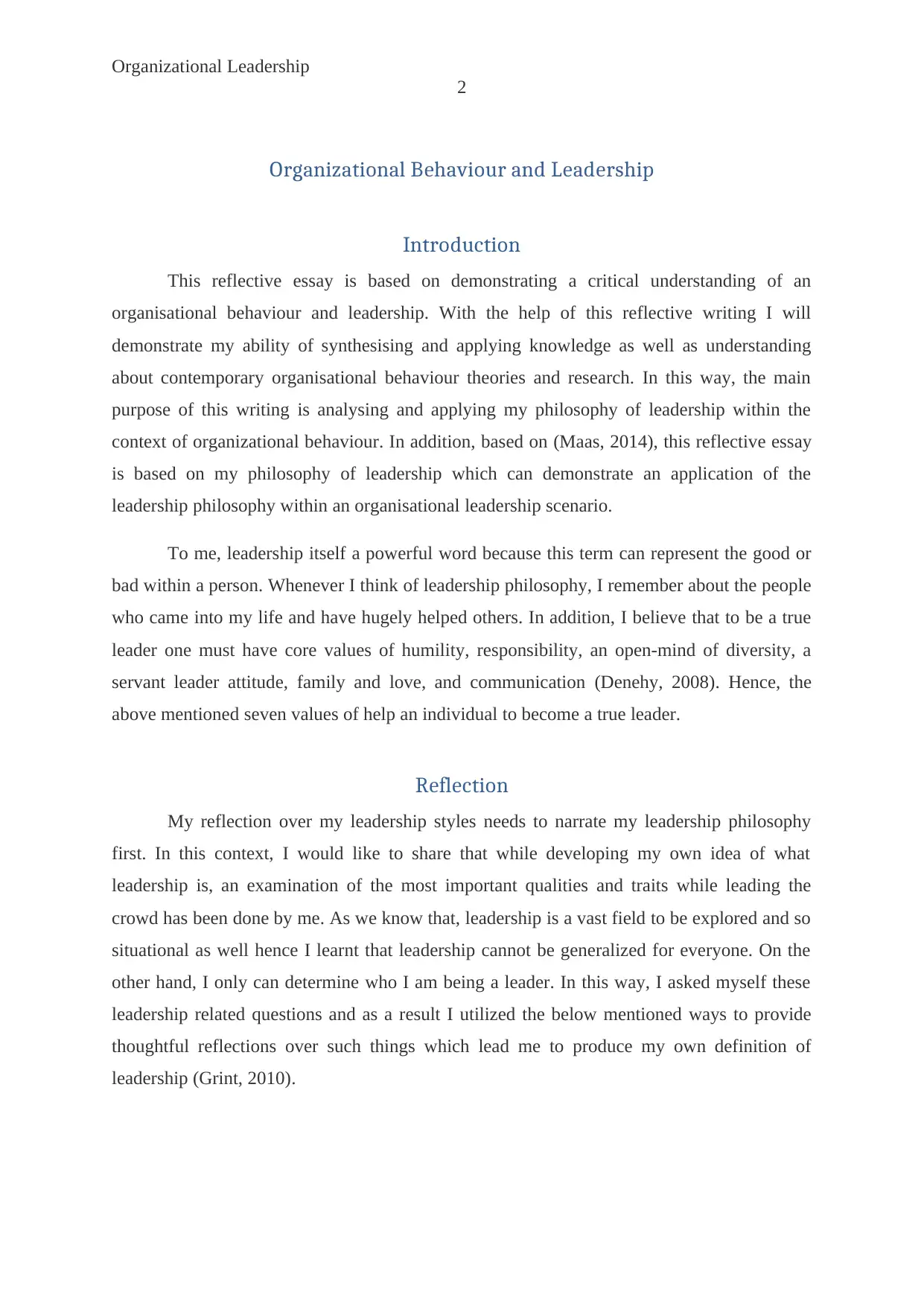
Organizational Leadership
2
Organizational Behaviour and Leadership
Introduction
This reflective essay is based on demonstrating a critical understanding of an
organisational behaviour and leadership. With the help of this reflective writing I will
demonstrate my ability of synthesising and applying knowledge as well as understanding
about contemporary organisational behaviour theories and research. In this way, the main
purpose of this writing is analysing and applying my philosophy of leadership within the
context of organizational behaviour. In addition, based on (Maas, 2014), this reflective essay
is based on my philosophy of leadership which can demonstrate an application of the
leadership philosophy within an organisational leadership scenario.
To me, leadership itself a powerful word because this term can represent the good or
bad within a person. Whenever I think of leadership philosophy, I remember about the people
who came into my life and have hugely helped others. In addition, I believe that to be a true
leader one must have core values of humility, responsibility, an open-mind of diversity, a
servant leader attitude, family and love, and communication (Denehy, 2008). Hence, the
above mentioned seven values of help an individual to become a true leader.
Reflection
My reflection over my leadership styles needs to narrate my leadership philosophy
first. In this context, I would like to share that while developing my own idea of what
leadership is, an examination of the most important qualities and traits while leading the
crowd has been done by me. As we know that, leadership is a vast field to be explored and so
situational as well hence I learnt that leadership cannot be generalized for everyone. On the
other hand, I only can determine who I am being a leader. In this way, I asked myself these
leadership related questions and as a result I utilized the below mentioned ways to provide
thoughtful reflections over such things which lead me to produce my own definition of
leadership (Grint, 2010).
2
Organizational Behaviour and Leadership
Introduction
This reflective essay is based on demonstrating a critical understanding of an
organisational behaviour and leadership. With the help of this reflective writing I will
demonstrate my ability of synthesising and applying knowledge as well as understanding
about contemporary organisational behaviour theories and research. In this way, the main
purpose of this writing is analysing and applying my philosophy of leadership within the
context of organizational behaviour. In addition, based on (Maas, 2014), this reflective essay
is based on my philosophy of leadership which can demonstrate an application of the
leadership philosophy within an organisational leadership scenario.
To me, leadership itself a powerful word because this term can represent the good or
bad within a person. Whenever I think of leadership philosophy, I remember about the people
who came into my life and have hugely helped others. In addition, I believe that to be a true
leader one must have core values of humility, responsibility, an open-mind of diversity, a
servant leader attitude, family and love, and communication (Denehy, 2008). Hence, the
above mentioned seven values of help an individual to become a true leader.
Reflection
My reflection over my leadership styles needs to narrate my leadership philosophy
first. In this context, I would like to share that while developing my own idea of what
leadership is, an examination of the most important qualities and traits while leading the
crowd has been done by me. As we know that, leadership is a vast field to be explored and so
situational as well hence I learnt that leadership cannot be generalized for everyone. On the
other hand, I only can determine who I am being a leader. In this way, I asked myself these
leadership related questions and as a result I utilized the below mentioned ways to provide
thoughtful reflections over such things which lead me to produce my own definition of
leadership (Grint, 2010).
⊘ This is a preview!⊘
Do you want full access?
Subscribe today to unlock all pages.

Trusted by 1+ million students worldwide
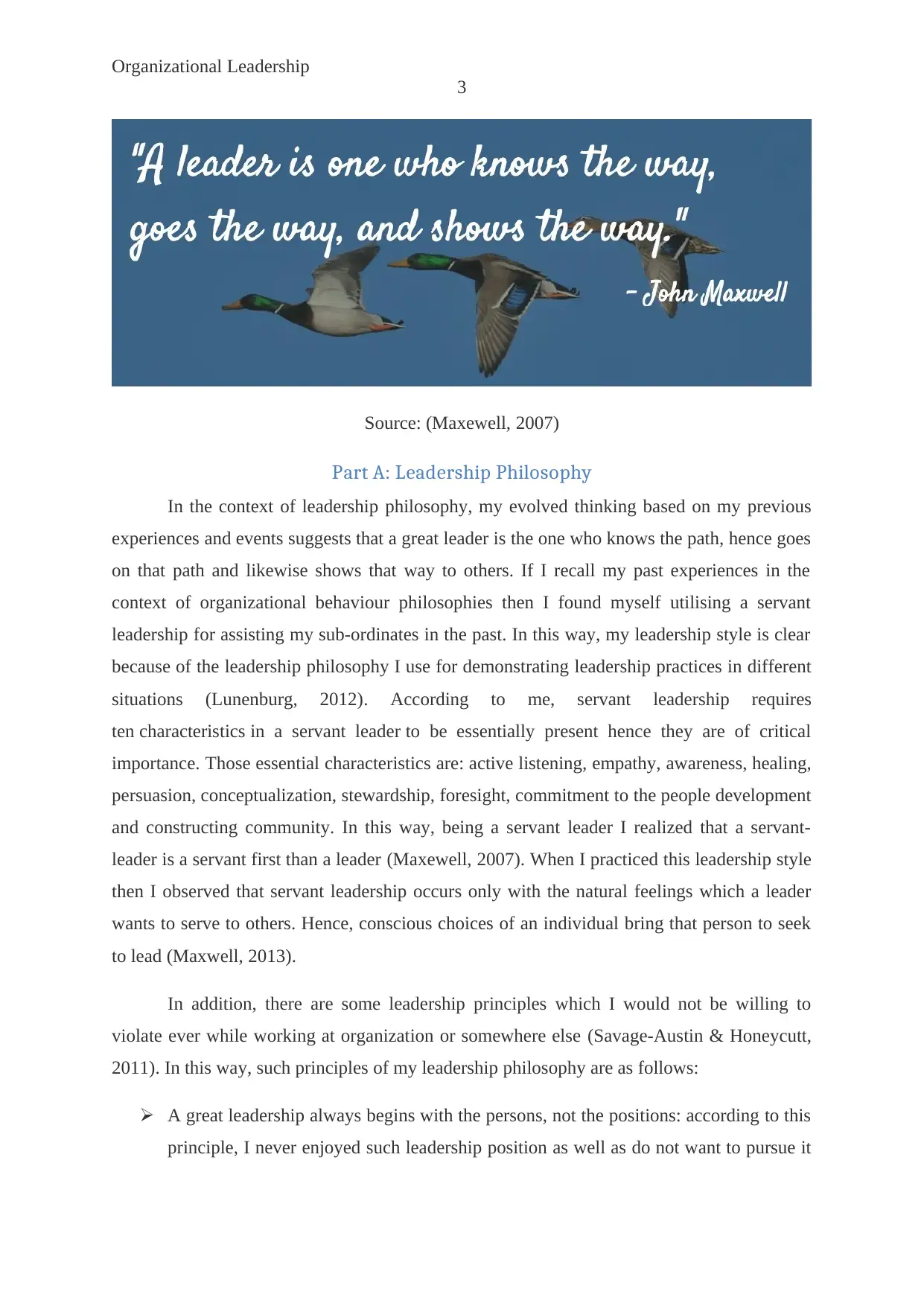
Organizational Leadership
3
Source: (Maxewell, 2007)
Part A: Leadership Philosophy
In the context of leadership philosophy, my evolved thinking based on my previous
experiences and events suggests that a great leader is the one who knows the path, hence goes
on that path and likewise shows that way to others. If I recall my past experiences in the
context of organizational behaviour philosophies then I found myself utilising a servant
leadership for assisting my sub-ordinates in the past. In this way, my leadership style is clear
because of the leadership philosophy I use for demonstrating leadership practices in different
situations (Lunenburg, 2012). According to me, servant leadership requires
ten characteristics in a servant leader to be essentially present hence they are of critical
importance. Those essential characteristics are: active listening, empathy, awareness, healing,
persuasion, conceptualization, stewardship, foresight, commitment to the people development
and constructing community. In this way, being a servant leader I realized that a servant-
leader is a servant first than a leader (Maxewell, 2007). When I practiced this leadership style
then I observed that servant leadership occurs only with the natural feelings which a leader
wants to serve to others. Hence, conscious choices of an individual bring that person to seek
to lead (Maxwell, 2013).
In addition, there are some leadership principles which I would not be willing to
violate ever while working at organization or somewhere else (Savage-Austin & Honeycutt,
2011). In this way, such principles of my leadership philosophy are as follows:
A great leadership always begins with the persons, not the positions: according to this
principle, I never enjoyed such leadership position as well as do not want to pursue it
3
Source: (Maxewell, 2007)
Part A: Leadership Philosophy
In the context of leadership philosophy, my evolved thinking based on my previous
experiences and events suggests that a great leader is the one who knows the path, hence goes
on that path and likewise shows that way to others. If I recall my past experiences in the
context of organizational behaviour philosophies then I found myself utilising a servant
leadership for assisting my sub-ordinates in the past. In this way, my leadership style is clear
because of the leadership philosophy I use for demonstrating leadership practices in different
situations (Lunenburg, 2012). According to me, servant leadership requires
ten characteristics in a servant leader to be essentially present hence they are of critical
importance. Those essential characteristics are: active listening, empathy, awareness, healing,
persuasion, conceptualization, stewardship, foresight, commitment to the people development
and constructing community. In this way, being a servant leader I realized that a servant-
leader is a servant first than a leader (Maxewell, 2007). When I practiced this leadership style
then I observed that servant leadership occurs only with the natural feelings which a leader
wants to serve to others. Hence, conscious choices of an individual bring that person to seek
to lead (Maxwell, 2013).
In addition, there are some leadership principles which I would not be willing to
violate ever while working at organization or somewhere else (Savage-Austin & Honeycutt,
2011). In this way, such principles of my leadership philosophy are as follows:
A great leadership always begins with the persons, not the positions: according to this
principle, I never enjoyed such leadership position as well as do not want to pursue it
Paraphrase This Document
Need a fresh take? Get an instant paraphrase of this document with our AI Paraphraser
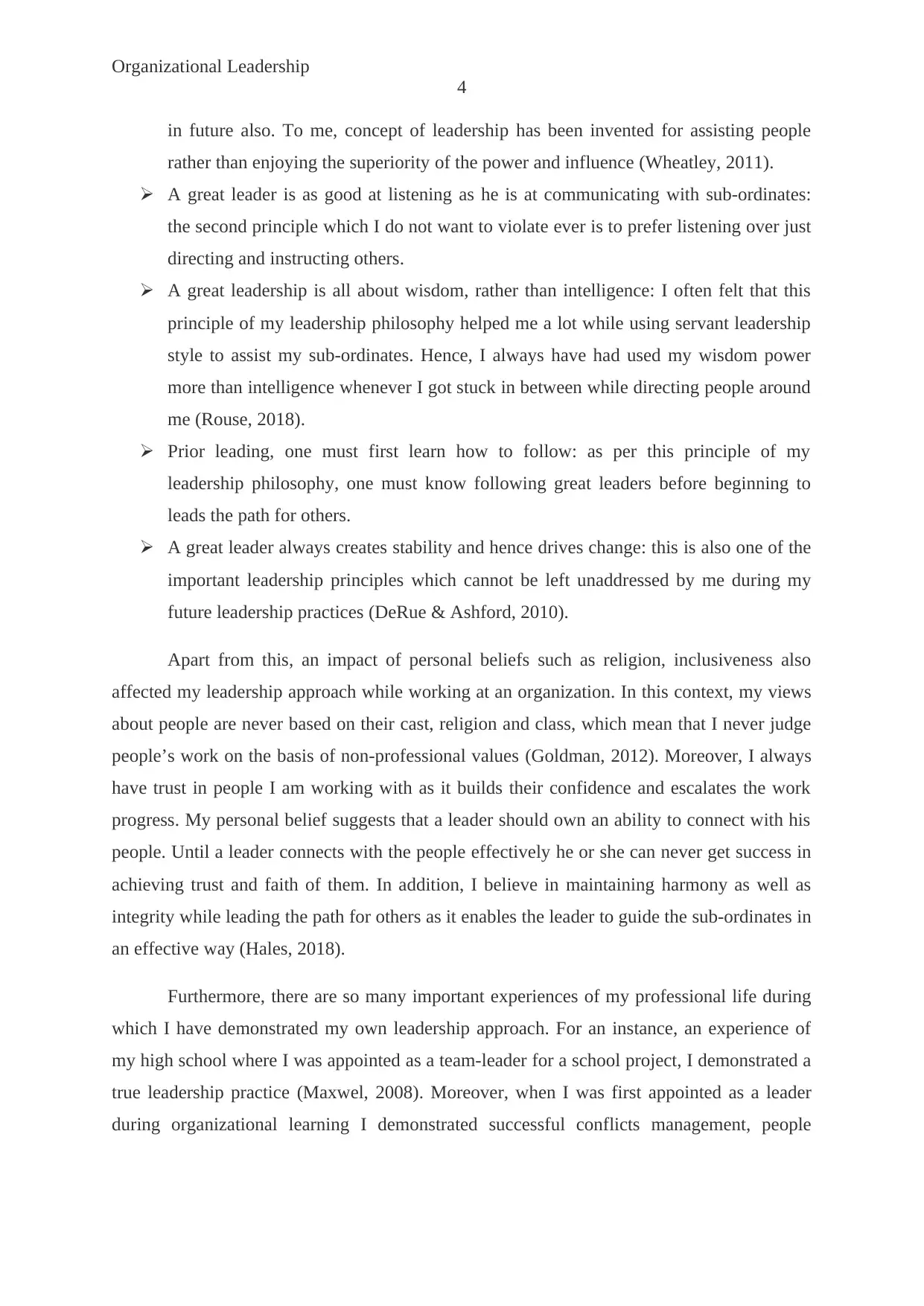
Organizational Leadership
4
in future also. To me, concept of leadership has been invented for assisting people
rather than enjoying the superiority of the power and influence (Wheatley, 2011).
A great leader is as good at listening as he is at communicating with sub-ordinates:
the second principle which I do not want to violate ever is to prefer listening over just
directing and instructing others.
A great leadership is all about wisdom, rather than intelligence: I often felt that this
principle of my leadership philosophy helped me a lot while using servant leadership
style to assist my sub-ordinates. Hence, I always have had used my wisdom power
more than intelligence whenever I got stuck in between while directing people around
me (Rouse, 2018).
Prior leading, one must first learn how to follow: as per this principle of my
leadership philosophy, one must know following great leaders before beginning to
leads the path for others.
A great leader always creates stability and hence drives change: this is also one of the
important leadership principles which cannot be left unaddressed by me during my
future leadership practices (DeRue & Ashford, 2010).
Apart from this, an impact of personal beliefs such as religion, inclusiveness also
affected my leadership approach while working at an organization. In this context, my views
about people are never based on their cast, religion and class, which mean that I never judge
people’s work on the basis of non-professional values (Goldman, 2012). Moreover, I always
have trust in people I am working with as it builds their confidence and escalates the work
progress. My personal belief suggests that a leader should own an ability to connect with his
people. Until a leader connects with the people effectively he or she can never get success in
achieving trust and faith of them. In addition, I believe in maintaining harmony as well as
integrity while leading the path for others as it enables the leader to guide the sub-ordinates in
an effective way (Hales, 2018).
Furthermore, there are so many important experiences of my professional life during
which I have demonstrated my own leadership approach. For an instance, an experience of
my high school where I was appointed as a team-leader for a school project, I demonstrated a
true leadership practice (Maxwel, 2008). Moreover, when I was first appointed as a leader
during organizational learning I demonstrated successful conflicts management, people
4
in future also. To me, concept of leadership has been invented for assisting people
rather than enjoying the superiority of the power and influence (Wheatley, 2011).
A great leader is as good at listening as he is at communicating with sub-ordinates:
the second principle which I do not want to violate ever is to prefer listening over just
directing and instructing others.
A great leadership is all about wisdom, rather than intelligence: I often felt that this
principle of my leadership philosophy helped me a lot while using servant leadership
style to assist my sub-ordinates. Hence, I always have had used my wisdom power
more than intelligence whenever I got stuck in between while directing people around
me (Rouse, 2018).
Prior leading, one must first learn how to follow: as per this principle of my
leadership philosophy, one must know following great leaders before beginning to
leads the path for others.
A great leader always creates stability and hence drives change: this is also one of the
important leadership principles which cannot be left unaddressed by me during my
future leadership practices (DeRue & Ashford, 2010).
Apart from this, an impact of personal beliefs such as religion, inclusiveness also
affected my leadership approach while working at an organization. In this context, my views
about people are never based on their cast, religion and class, which mean that I never judge
people’s work on the basis of non-professional values (Goldman, 2012). Moreover, I always
have trust in people I am working with as it builds their confidence and escalates the work
progress. My personal belief suggests that a leader should own an ability to connect with his
people. Until a leader connects with the people effectively he or she can never get success in
achieving trust and faith of them. In addition, I believe in maintaining harmony as well as
integrity while leading the path for others as it enables the leader to guide the sub-ordinates in
an effective way (Hales, 2018).
Furthermore, there are so many important experiences of my professional life during
which I have demonstrated my own leadership approach. For an instance, an experience of
my high school where I was appointed as a team-leader for a school project, I demonstrated a
true leadership practice (Maxwel, 2008). Moreover, when I was first appointed as a leader
during organizational learning I demonstrated successful conflicts management, people
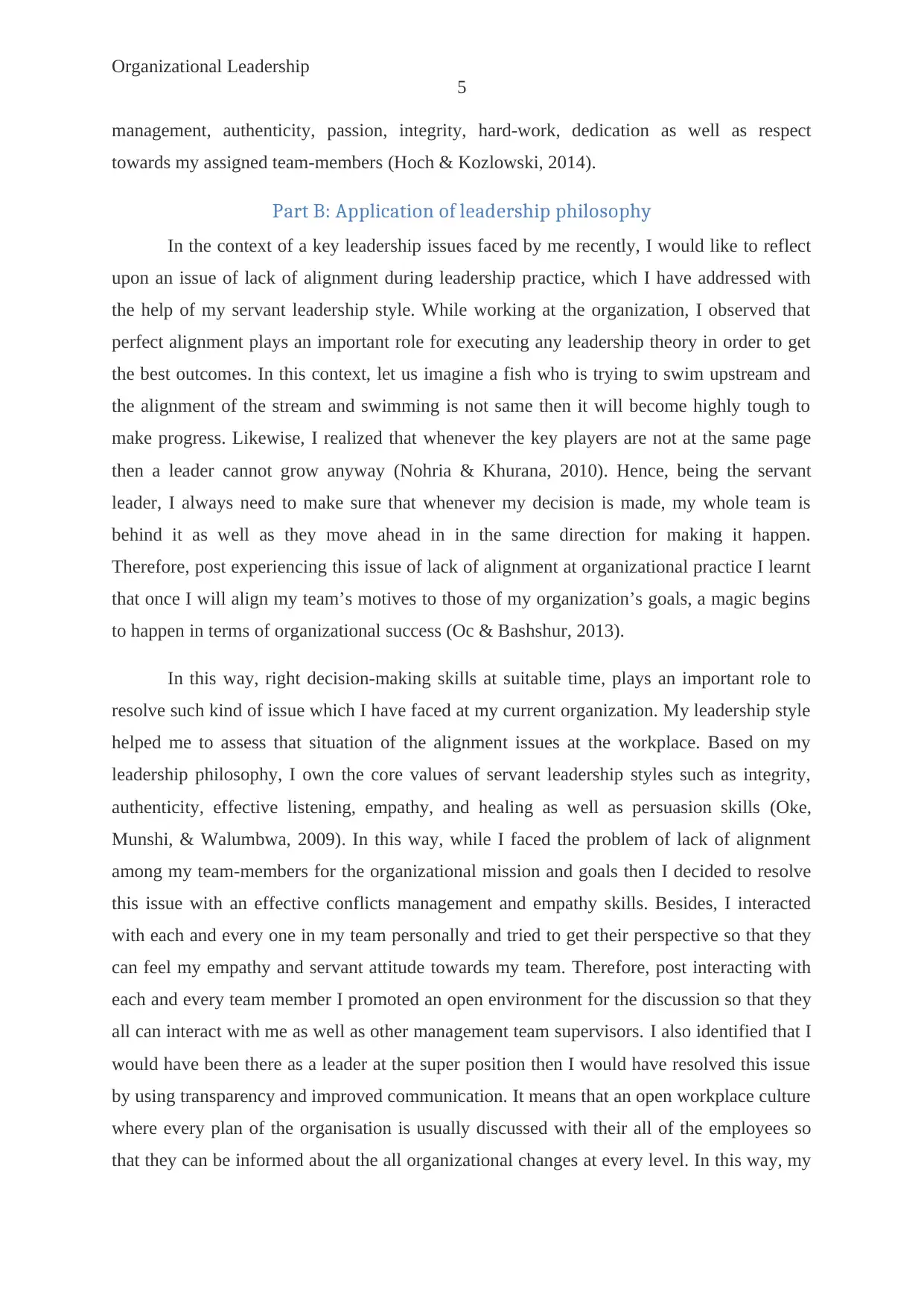
Organizational Leadership
5
management, authenticity, passion, integrity, hard-work, dedication as well as respect
towards my assigned team-members (Hoch & Kozlowski, 2014).
Part B: Application of leadership philosophy
In the context of a key leadership issues faced by me recently, I would like to reflect
upon an issue of lack of alignment during leadership practice, which I have addressed with
the help of my servant leadership style. While working at the organization, I observed that
perfect alignment plays an important role for executing any leadership theory in order to get
the best outcomes. In this context, let us imagine a fish who is trying to swim upstream and
the alignment of the stream and swimming is not same then it will become highly tough to
make progress. Likewise, I realized that whenever the key players are not at the same page
then a leader cannot grow anyway (Nohria & Khurana, 2010). Hence, being the servant
leader, I always need to make sure that whenever my decision is made, my whole team is
behind it as well as they move ahead in in the same direction for making it happen.
Therefore, post experiencing this issue of lack of alignment at organizational practice I learnt
that once I will align my team’s motives to those of my organization’s goals, a magic begins
to happen in terms of organizational success (Oc & Bashshur, 2013).
In this way, right decision-making skills at suitable time, plays an important role to
resolve such kind of issue which I have faced at my current organization. My leadership style
helped me to assess that situation of the alignment issues at the workplace. Based on my
leadership philosophy, I own the core values of servant leadership styles such as integrity,
authenticity, effective listening, empathy, and healing as well as persuasion skills (Oke,
Munshi, & Walumbwa, 2009). In this way, while I faced the problem of lack of alignment
among my team-members for the organizational mission and goals then I decided to resolve
this issue with an effective conflicts management and empathy skills. Besides, I interacted
with each and every one in my team personally and tried to get their perspective so that they
can feel my empathy and servant attitude towards my team. Therefore, post interacting with
each and every team member I promoted an open environment for the discussion so that they
all can interact with me as well as other management team supervisors. I also identified that I
would have been there as a leader at the super position then I would have resolved this issue
by using transparency and improved communication. It means that an open workplace culture
where every plan of the organisation is usually discussed with their all of the employees so
that they can be informed about the all organizational changes at every level. In this way, my
5
management, authenticity, passion, integrity, hard-work, dedication as well as respect
towards my assigned team-members (Hoch & Kozlowski, 2014).
Part B: Application of leadership philosophy
In the context of a key leadership issues faced by me recently, I would like to reflect
upon an issue of lack of alignment during leadership practice, which I have addressed with
the help of my servant leadership style. While working at the organization, I observed that
perfect alignment plays an important role for executing any leadership theory in order to get
the best outcomes. In this context, let us imagine a fish who is trying to swim upstream and
the alignment of the stream and swimming is not same then it will become highly tough to
make progress. Likewise, I realized that whenever the key players are not at the same page
then a leader cannot grow anyway (Nohria & Khurana, 2010). Hence, being the servant
leader, I always need to make sure that whenever my decision is made, my whole team is
behind it as well as they move ahead in in the same direction for making it happen.
Therefore, post experiencing this issue of lack of alignment at organizational practice I learnt
that once I will align my team’s motives to those of my organization’s goals, a magic begins
to happen in terms of organizational success (Oc & Bashshur, 2013).
In this way, right decision-making skills at suitable time, plays an important role to
resolve such kind of issue which I have faced at my current organization. My leadership style
helped me to assess that situation of the alignment issues at the workplace. Based on my
leadership philosophy, I own the core values of servant leadership styles such as integrity,
authenticity, effective listening, empathy, and healing as well as persuasion skills (Oke,
Munshi, & Walumbwa, 2009). In this way, while I faced the problem of lack of alignment
among my team-members for the organizational mission and goals then I decided to resolve
this issue with an effective conflicts management and empathy skills. Besides, I interacted
with each and every one in my team personally and tried to get their perspective so that they
can feel my empathy and servant attitude towards my team. Therefore, post interacting with
each and every team member I promoted an open environment for the discussion so that they
all can interact with me as well as other management team supervisors. I also identified that I
would have been there as a leader at the super position then I would have resolved this issue
by using transparency and improved communication. It means that an open workplace culture
where every plan of the organisation is usually discussed with their all of the employees so
that they can be informed about the all organizational changes at every level. In this way, my
⊘ This is a preview!⊘
Do you want full access?
Subscribe today to unlock all pages.

Trusted by 1+ million students worldwide
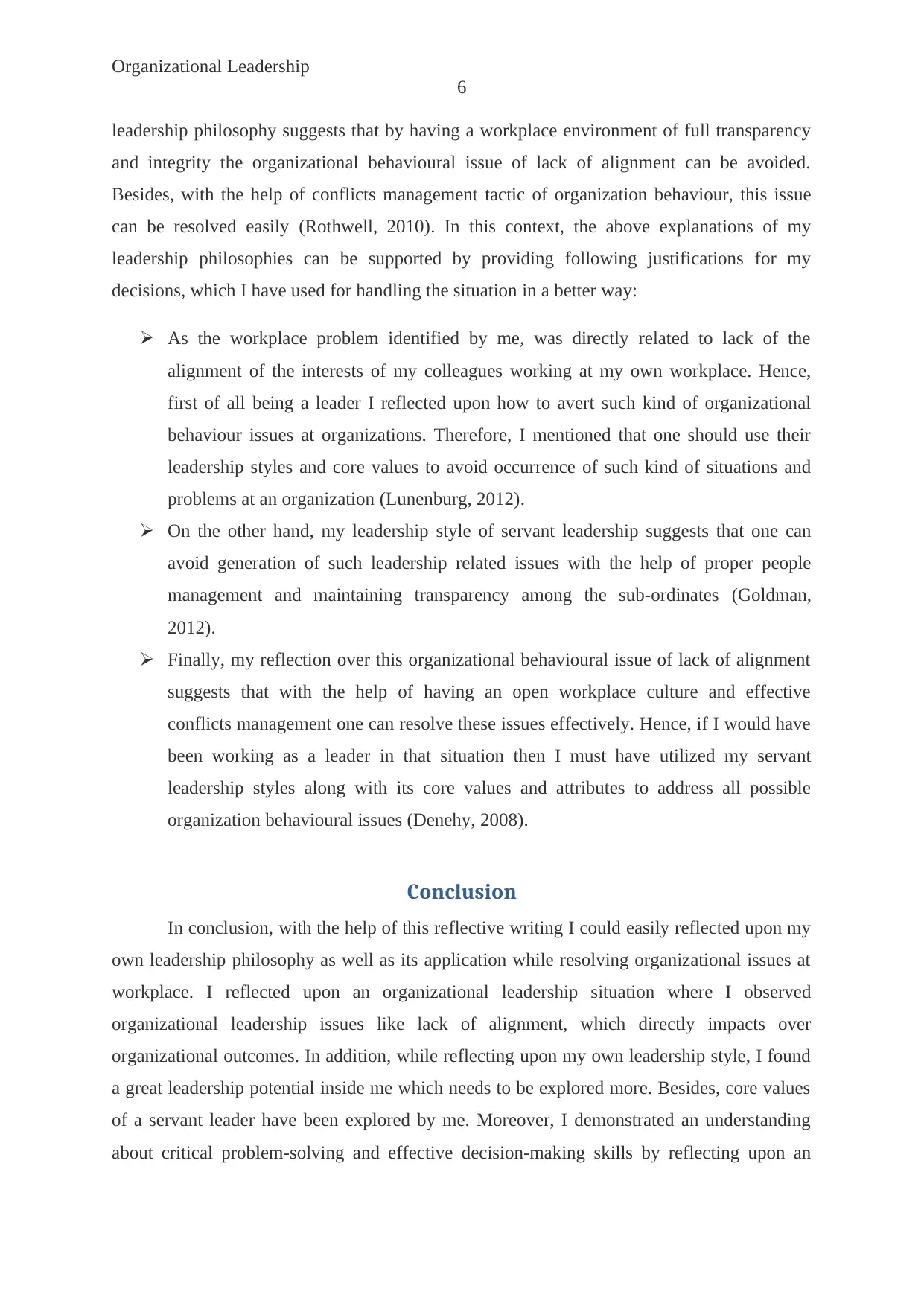
Organizational Leadership
6
leadership philosophy suggests that by having a workplace environment of full transparency
and integrity the organizational behavioural issue of lack of alignment can be avoided.
Besides, with the help of conflicts management tactic of organization behaviour, this issue
can be resolved easily (Rothwell, 2010). In this context, the above explanations of my
leadership philosophies can be supported by providing following justifications for my
decisions, which I have used for handling the situation in a better way:
As the workplace problem identified by me, was directly related to lack of the
alignment of the interests of my colleagues working at my own workplace. Hence,
first of all being a leader I reflected upon how to avert such kind of organizational
behaviour issues at organizations. Therefore, I mentioned that one should use their
leadership styles and core values to avoid occurrence of such kind of situations and
problems at an organization (Lunenburg, 2012).
On the other hand, my leadership style of servant leadership suggests that one can
avoid generation of such leadership related issues with the help of proper people
management and maintaining transparency among the sub-ordinates (Goldman,
2012).
Finally, my reflection over this organizational behavioural issue of lack of alignment
suggests that with the help of having an open workplace culture and effective
conflicts management one can resolve these issues effectively. Hence, if I would have
been working as a leader in that situation then I must have utilized my servant
leadership styles along with its core values and attributes to address all possible
organization behavioural issues (Denehy, 2008).
Conclusion
In conclusion, with the help of this reflective writing I could easily reflected upon my
own leadership philosophy as well as its application while resolving organizational issues at
workplace. I reflected upon an organizational leadership situation where I observed
organizational leadership issues like lack of alignment, which directly impacts over
organizational outcomes. In addition, while reflecting upon my own leadership style, I found
a great leadership potential inside me which needs to be explored more. Besides, core values
of a servant leader have been explored by me. Moreover, I demonstrated an understanding
about critical problem-solving and effective decision-making skills by reflecting upon an
6
leadership philosophy suggests that by having a workplace environment of full transparency
and integrity the organizational behavioural issue of lack of alignment can be avoided.
Besides, with the help of conflicts management tactic of organization behaviour, this issue
can be resolved easily (Rothwell, 2010). In this context, the above explanations of my
leadership philosophies can be supported by providing following justifications for my
decisions, which I have used for handling the situation in a better way:
As the workplace problem identified by me, was directly related to lack of the
alignment of the interests of my colleagues working at my own workplace. Hence,
first of all being a leader I reflected upon how to avert such kind of organizational
behaviour issues at organizations. Therefore, I mentioned that one should use their
leadership styles and core values to avoid occurrence of such kind of situations and
problems at an organization (Lunenburg, 2012).
On the other hand, my leadership style of servant leadership suggests that one can
avoid generation of such leadership related issues with the help of proper people
management and maintaining transparency among the sub-ordinates (Goldman,
2012).
Finally, my reflection over this organizational behavioural issue of lack of alignment
suggests that with the help of having an open workplace culture and effective
conflicts management one can resolve these issues effectively. Hence, if I would have
been working as a leader in that situation then I must have utilized my servant
leadership styles along with its core values and attributes to address all possible
organization behavioural issues (Denehy, 2008).
Conclusion
In conclusion, with the help of this reflective writing I could easily reflected upon my
own leadership philosophy as well as its application while resolving organizational issues at
workplace. I reflected upon an organizational leadership situation where I observed
organizational leadership issues like lack of alignment, which directly impacts over
organizational outcomes. In addition, while reflecting upon my own leadership style, I found
a great leadership potential inside me which needs to be explored more. Besides, core values
of a servant leader have been explored by me. Moreover, I demonstrated an understanding
about critical problem-solving and effective decision-making skills by reflecting upon an
Paraphrase This Document
Need a fresh take? Get an instant paraphrase of this document with our AI Paraphraser
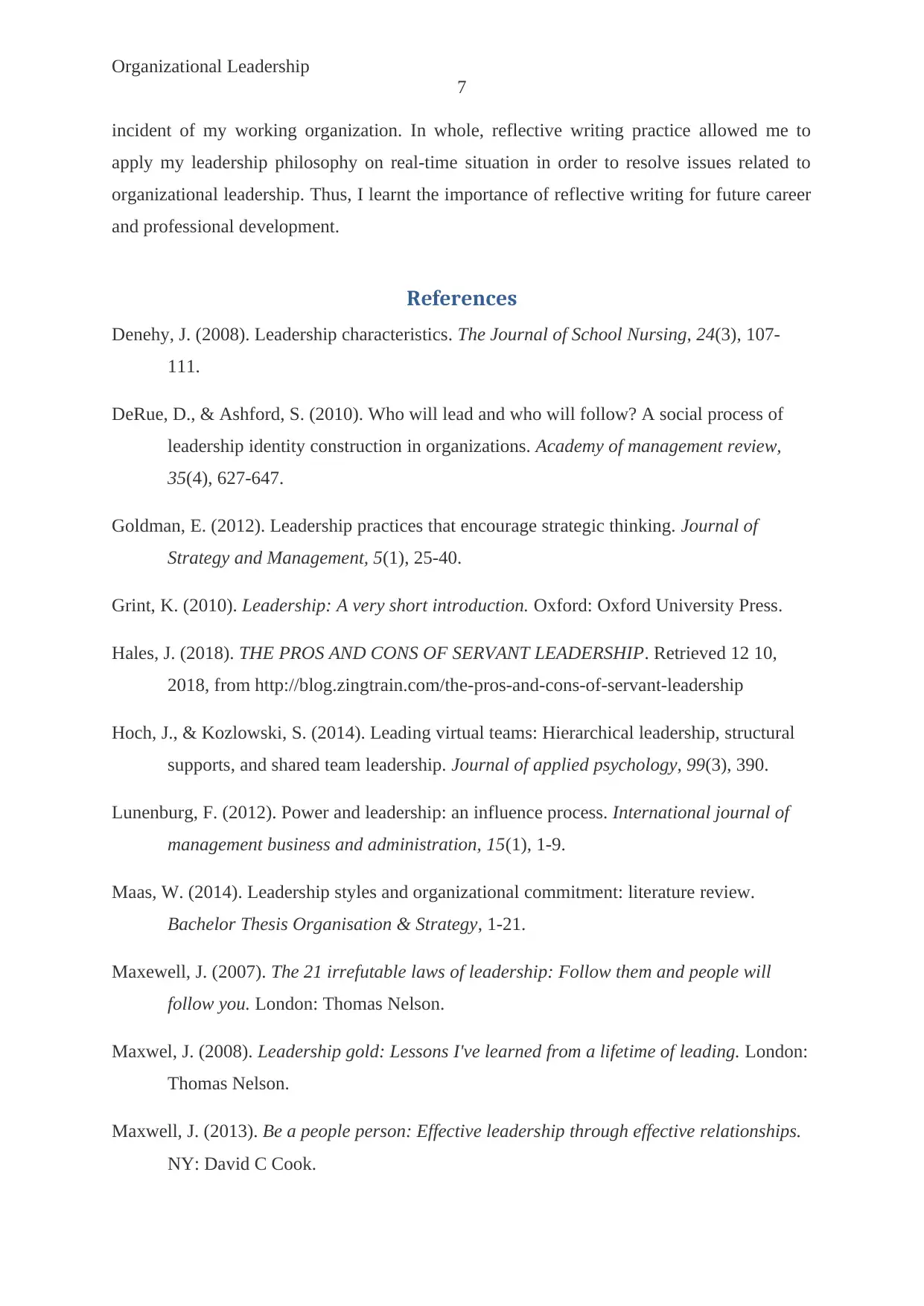
Organizational Leadership
7
incident of my working organization. In whole, reflective writing practice allowed me to
apply my leadership philosophy on real-time situation in order to resolve issues related to
organizational leadership. Thus, I learnt the importance of reflective writing for future career
and professional development.
References
Denehy, J. (2008). Leadership characteristics. The Journal of School Nursing, 24(3), 107-
111.
DeRue, D., & Ashford, S. (2010). Who will lead and who will follow? A social process of
leadership identity construction in organizations. Academy of management review,
35(4), 627-647.
Goldman, E. (2012). Leadership practices that encourage strategic thinking. Journal of
Strategy and Management, 5(1), 25-40.
Grint, K. (2010). Leadership: A very short introduction. Oxford: Oxford University Press.
Hales, J. (2018). THE PROS AND CONS OF SERVANT LEADERSHIP. Retrieved 12 10,
2018, from http://blog.zingtrain.com/the-pros-and-cons-of-servant-leadership
Hoch, J., & Kozlowski, S. (2014). Leading virtual teams: Hierarchical leadership, structural
supports, and shared team leadership. Journal of applied psychology, 99(3), 390.
Lunenburg, F. (2012). Power and leadership: an influence process. International journal of
management business and administration, 15(1), 1-9.
Maas, W. (2014). Leadership styles and organizational commitment: literature review.
Bachelor Thesis Organisation & Strategy, 1-21.
Maxewell, J. (2007). The 21 irrefutable laws of leadership: Follow them and people will
follow you. London: Thomas Nelson.
Maxwel, J. (2008). Leadership gold: Lessons I've learned from a lifetime of leading. London:
Thomas Nelson.
Maxwell, J. (2013). Be a people person: Effective leadership through effective relationships.
NY: David C Cook.
7
incident of my working organization. In whole, reflective writing practice allowed me to
apply my leadership philosophy on real-time situation in order to resolve issues related to
organizational leadership. Thus, I learnt the importance of reflective writing for future career
and professional development.
References
Denehy, J. (2008). Leadership characteristics. The Journal of School Nursing, 24(3), 107-
111.
DeRue, D., & Ashford, S. (2010). Who will lead and who will follow? A social process of
leadership identity construction in organizations. Academy of management review,
35(4), 627-647.
Goldman, E. (2012). Leadership practices that encourage strategic thinking. Journal of
Strategy and Management, 5(1), 25-40.
Grint, K. (2010). Leadership: A very short introduction. Oxford: Oxford University Press.
Hales, J. (2018). THE PROS AND CONS OF SERVANT LEADERSHIP. Retrieved 12 10,
2018, from http://blog.zingtrain.com/the-pros-and-cons-of-servant-leadership
Hoch, J., & Kozlowski, S. (2014). Leading virtual teams: Hierarchical leadership, structural
supports, and shared team leadership. Journal of applied psychology, 99(3), 390.
Lunenburg, F. (2012). Power and leadership: an influence process. International journal of
management business and administration, 15(1), 1-9.
Maas, W. (2014). Leadership styles and organizational commitment: literature review.
Bachelor Thesis Organisation & Strategy, 1-21.
Maxewell, J. (2007). The 21 irrefutable laws of leadership: Follow them and people will
follow you. London: Thomas Nelson.
Maxwel, J. (2008). Leadership gold: Lessons I've learned from a lifetime of leading. London:
Thomas Nelson.
Maxwell, J. (2013). Be a people person: Effective leadership through effective relationships.
NY: David C Cook.
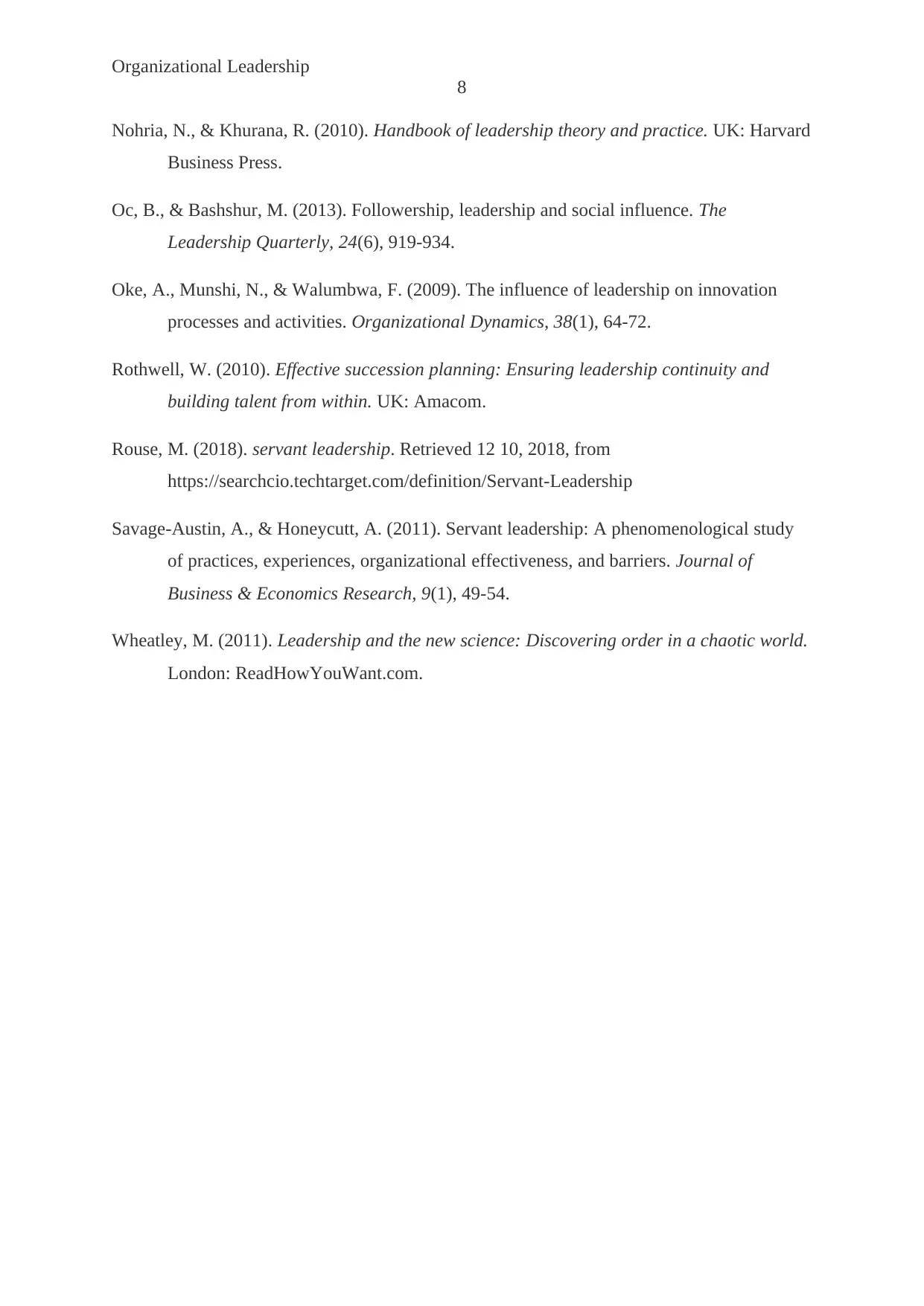
Organizational Leadership
8
Nohria, N., & Khurana, R. (2010). Handbook of leadership theory and practice. UK: Harvard
Business Press.
Oc, B., & Bashshur, M. (2013). Followership, leadership and social influence. The
Leadership Quarterly, 24(6), 919-934.
Oke, A., Munshi, N., & Walumbwa, F. (2009). The influence of leadership on innovation
processes and activities. Organizational Dynamics, 38(1), 64-72.
Rothwell, W. (2010). Effective succession planning: Ensuring leadership continuity and
building talent from within. UK: Amacom.
Rouse, M. (2018). servant leadership. Retrieved 12 10, 2018, from
https://searchcio.techtarget.com/definition/Servant-Leadership
Savage-Austin, A., & Honeycutt, A. (2011). Servant leadership: A phenomenological study
of practices, experiences, organizational effectiveness, and barriers. Journal of
Business & Economics Research, 9(1), 49-54.
Wheatley, M. (2011). Leadership and the new science: Discovering order in a chaotic world.
London: ReadHowYouWant.com.
8
Nohria, N., & Khurana, R. (2010). Handbook of leadership theory and practice. UK: Harvard
Business Press.
Oc, B., & Bashshur, M. (2013). Followership, leadership and social influence. The
Leadership Quarterly, 24(6), 919-934.
Oke, A., Munshi, N., & Walumbwa, F. (2009). The influence of leadership on innovation
processes and activities. Organizational Dynamics, 38(1), 64-72.
Rothwell, W. (2010). Effective succession planning: Ensuring leadership continuity and
building talent from within. UK: Amacom.
Rouse, M. (2018). servant leadership. Retrieved 12 10, 2018, from
https://searchcio.techtarget.com/definition/Servant-Leadership
Savage-Austin, A., & Honeycutt, A. (2011). Servant leadership: A phenomenological study
of practices, experiences, organizational effectiveness, and barriers. Journal of
Business & Economics Research, 9(1), 49-54.
Wheatley, M. (2011). Leadership and the new science: Discovering order in a chaotic world.
London: ReadHowYouWant.com.
⊘ This is a preview!⊘
Do you want full access?
Subscribe today to unlock all pages.

Trusted by 1+ million students worldwide
1 out of 9
Related Documents
Your All-in-One AI-Powered Toolkit for Academic Success.
+13062052269
info@desklib.com
Available 24*7 on WhatsApp / Email
![[object Object]](/_next/static/media/star-bottom.7253800d.svg)
Unlock your academic potential
Copyright © 2020–2026 A2Z Services. All Rights Reserved. Developed and managed by ZUCOL.




